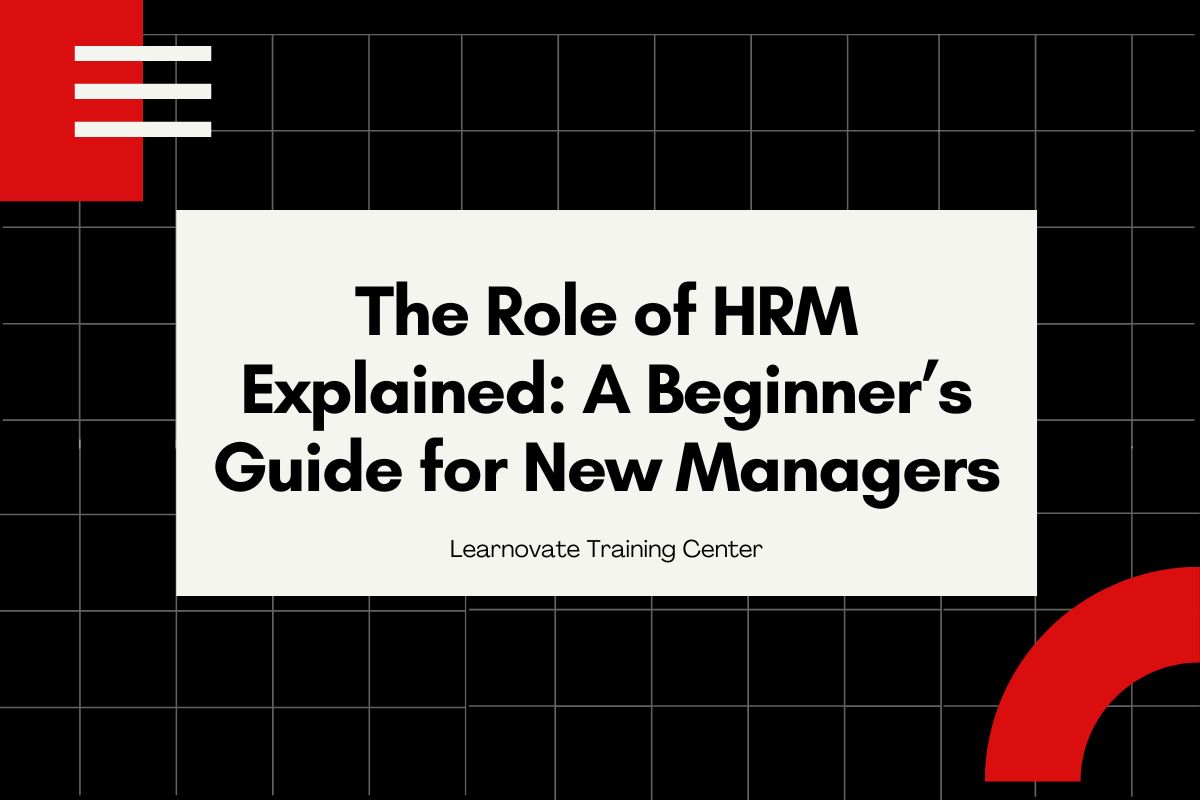Becoming a manager isn’t just about overseeing tasks—it’s about managing people. And managing people effectively requires understanding the systems, principles, and strategies that guide human behavior in the workplace. That’s where Human Resource Management (HRM) comes in.
You might think HRM is something only the Human Resources department needs to worry about, but in reality, every manager plays an informal HR role. From hiring and onboarding to performance reviews and conflict resolution, managers are the boots on the ground, making HR policies come alive.
But what exactly does HRM involve, and why should it matter to you as a new manager? Let’s unpack it.
What is Human Resource Management?
Human Resource Management refers to the strategic and operational activities involved in managing people within an organization. It encompasses recruiting, developing, motivating, and retaining employees to ensure that business objectives are met.
In simpler terms, HRM is all about managing the employee lifecycle—from the moment someone applies for a job to the day they leave the company (and sometimes beyond). Key components of HRM include:
- Recruitment and selection
- Training and development
- Performance management
- Compensation and benefits
- Employee relations
- Health and safety compliance
- Labor law compliance
Understanding these components isn’t just “HR stuff.” As a manager, you interact with many of these areas daily, whether you’re filling a vacancy, giving feedback, approving time off, or resolving conflicts.
If you want a solid foundation in these skills, consider enrolling in the Certified Human Resource Manager (CHRM) course in Dubai, offered by Learnovate. This course equips managers and professionals with practical knowledge of HR strategies, helping you lead confidently in today’s dynamic workplace.
Why Does HRM Matter for New Managers?
New managers are often surprised by how much time they spend dealing with people-related issues. You might have envisioned focusing solely on project deliverables or technical work, but soon realize that motivating people, resolving disputes, and supporting employee growth are equally critical.
Here’s why understanding HRM is essential for you as a manager:
- It helps you build high-performing teams.
Good hiring, onboarding, and development practices ensure capable, motivated employees surround you. - It improves employee engagement and retention.
Employees are more likely to stay in an environment where they feel valued, supported, and fairly treated. - It protects you from legal and ethical risks.
Understanding workplace laws and policies keeps you compliant and avoids costly mistakes. - It strengthens leadership credibility.
Managers who handle people issues well earn trust, respect, and cooperation from their teams. - It drives organizational success.
Ultimately, happy, productive employees translate into better results for the organization.
In short, HRM provides the framework that allows managers to lead teams effectively, handle challenges proactively, and align people with organizational goals.
The Key Functions of HRM Every Manager Should Know
Let’s explore the main functions of HRM, with practical insights into how they intersect with your role as a manager.
Recruitment and Selection
Recruitment is more than filling an empty chair. It’s about finding the right person who will thrive in your team’s culture and meet performance expectations.
As a manager, you’ll likely participate in writing job descriptions, interviewing candidates, and making hiring decisions. Collaborating closely with HR ensures you’re attracting candidates with the right skills and mindset.
Practical tips for managers:
- Write clear, accurate job descriptions aligned with real team needs.
- Use behavioral interview questions to assess past performance.
- Prioritize cultural fit along with technical skills.
Want to learn modern recruitment strategies that work? The CHRM course in Dubai offered by Learnovate provides hands-on techniques to improve your hiring process.
Training and Development
An often overlooked HR function is employee development. But investing in your team’s skills pays off with higher productivity, innovation, and retention.
Managers play a crucial role in identifying development needs and supporting learning opportunities.
Practical tips for managers:
- Have regular career development conversations with team members.
- Recommend relevant courses, certifications, or projects for growth.
- Support cross-training and mentoring within the team.
Developing people isn’t just HR’s job—it’s a shared responsibility. By actively promoting growth, you position yourself as a leader who invests in others’ success.
Performance Management
Performance management goes beyond annual reviews. It’s about setting clear expectations, providing continuous feedback, and coaching employees toward their goals.
Managers are at the heart of this process. You’re the one observing day-to-day performance and providing actionable feedback.
Practical tips for managers:
- Set SMART goals collaboratively with each employee.
- Schedule frequent check-ins to track progress and address issues early.
- Recognize achievements publicly to boost morale.
Learning how to handle performance reviews, feedback sessions, and performance improvement plans is covered in depth in the CHRM course in Dubai, making it an excellent resource for new managers.
Compensation and Benefits
While salary structures are typically determined by HR and leadership, managers have an indirect role in compensation. You may advocate for raises, approve bonuses, or explain benefit options to your team.
Understanding how compensation ties to motivation and retention helps you be a fair and effective leader.
Practical tips for managers:
- Be transparent about pay structures and reward criteria.
- Use non-monetary rewards (like recognition and flexibility) to complement financial incentives.
- Support equity and fairness when recommending promotions or raises.
Employee Relations
Employee relations refer to how employees interact with one another, with management, and with the organization as a whole. As a manager, you’re the first point of contact for complaints, conflicts, or morale issues.
Strong employee relations promote a healthy work environment, reduce turnover, and minimize grievances.
Practical tips for managers:
- Encourage open communication within the team.
- Address small issues before they escalate into big problems.
- Follow company policies fairly and consistently.
Compliance with Laws and Policies
Every workplace must follow local labor laws and organizational policies covering issues like discrimination, harassment, health and safety, and wage compliance. Managers must enforce these rules to avoid legal or ethical violations.
Even if you’re not an expert in employment law, being familiar with the basics protects both your team and the organization.
Practical tips for managers:
- Attend compliance training provided by HR.
- Keep updated on changes in labor laws affecting your region.
- Document important conversations or disciplinary actions properly.
Learnovate’s Certified Human Resource Manager (CHRM) course can help managers gain clarity on legal compliance, helping you stay on the right side of workplace regulations.
The Manager-HR Partnership
A common misconception is that HR is solely responsible for “people stuff.” In reality, HR and managers are partners. HR provides the tools, frameworks, and policies; managers apply them in real-time interactions.
This partnership works best when managers actively engage with HR, whether in hiring, conflict resolution, performance management, or employee development.
By building strong relationships with HR professionals, you gain access to valuable expertise that can guide tricky decisions and improve outcomes for your team.
How Managers Can Grow Their HRM Skills
If you’re a new manager wondering how to build confidence in HR topics, here are a few actionable steps:
- Attend internal HR workshops or webinars
- Shadow HR professionals during recruitment or disciplinary meetings
- Enroll in formal training like the CHRM course in Dubai
- Read HR-related books, blogs, and case studies
- Seek feedback from HR partners on your leadership approach
Investing in your HRM skills not only makes you a more effective leader but also boosts your career prospects by expanding your leadership toolkit.
Final Thoughts: Why Every Manager Needs HRM Knowledge
Human Resource Management isn’t a “nice to have” skill for managers—it’s a must-have. Every decision you make about hiring, coaching, rewarding, or disciplining affects your team’s engagement, performance, and well-being.
By understanding HRM, you lead with greater empathy, fairness, and effectiveness. You’ll navigate challenges with confidence, inspire trust, and create a positive work culture where people—and results—thrive.
If you’re ready to deepen your knowledge of HR strategies, consider joining the Certified Human Resource Manager (CHRM) course in Dubai at Learnovate. This comprehensive program equips managers like you with the practical skills needed to handle real-world HR challenges.
Becoming an exceptional manager starts with understanding the people side of business. With HRM knowledge in your leadership arsenal, you’re well on your way.














